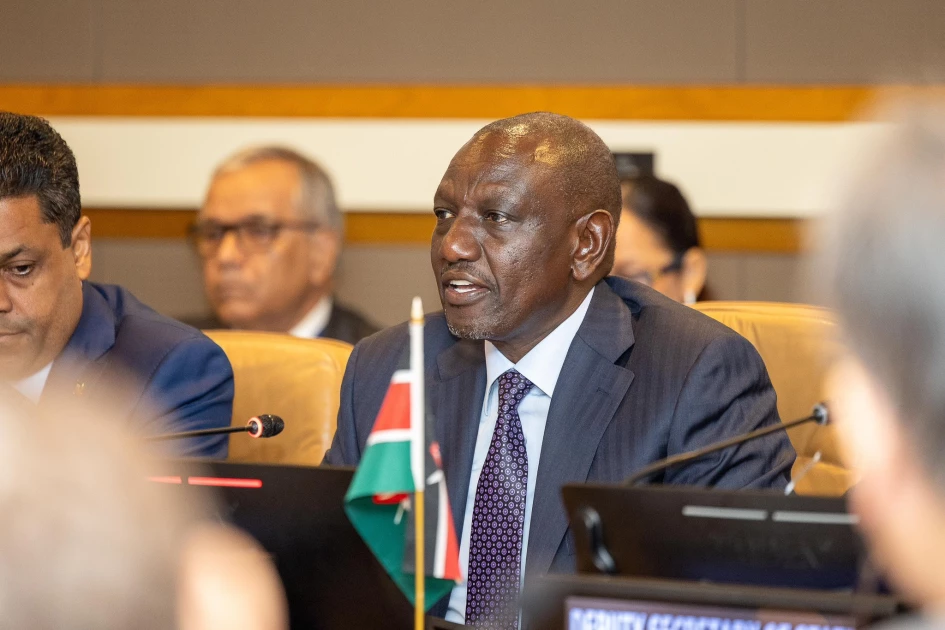Low capacity, second-hand cars: Ruto decries logistical woes in Kenya-led Haiti mission

President William Ruto addresses a high-level meeting on Haiti at the United Nations headquarters in New York, on the side-lines of the 80th Session of the UN General Assembly, September 22, 2025. | PHOTO: PCS

Audio By Vocalize
President William Ruto on Monday bemoaned severe logistical
and resource challenges hampering the Kenya-led Multinational Security Support
Mission (MSS) in Haiti.
At a high-level event on Haiti co-hosted by Kenya and the
United States on the side-lines of the United Nations General Assembly in New
York, Ruto said the mission has been operating at only 40 percent capacity.
“Initially, it was expected that 2,500 security personnel
would be made available. Unfortunately, they were not,” he told delegates about
the mission deployed in June 2024 after endorsement by the U.N. Security
Council.
“It was also expected that there would have been force
multipliers, that we would have armoured personnel carriers, and we would have
enough logistical support to make this mission successful.”
Kenya leads the mission with 735 out of a total
989 officers, supported by contingents from Guatemala, El Salvador,
Jamaica, The Bahamas, and Canada.
But while Ruto commended the United States for providing
logistical vehicles, he said most were second-hand and prone to breakdowns,
exposing Kenyan officers to danger in hostile areas.
"Most of the vehicles were second-hand vehicles, and
therefore, they broke down a lot many times. And in fact, it put our personnel
in great danger when they broke down in very dangerous places," he
said. “At least they stepped up. We didn’t, however, get any useful
support from any other quarter.”
Ruto stressed that Haiti’s crisis required consistent
international backing, saying, “I believe that the situation in Haiti can be
solved; it is not Mission Impossible. What is going on in Haiti is
unacceptable, indefensible, simply wrong.”
With the MSS mandate set to expire on October 2, the U.S.
and Haiti on Monday called for transforming the mission into a more robust
force to target powerful gangs, per a dispatch sent to newsrooms by Ruto’s
office.
United States Deputy Secretary of State Christopher Landau
said the U.S. and Panama had worked with Haiti to introduce a U.N. Security
Council resolution to establish a larger force with a broader mandate.
The new force would consist of 5,500 personnel, more than
five times the size of the current MSS, Landau said, and a U.N. support office
for Haiti previously suggested by Secretary-General Antonio Guterres to provide
the necessary logistical and financial support.
Amid these discussions, Ruto has called for clarity in
planning a successor mission and urged the international community to urgently
step up support to stabilise Haiti.
At Monday’s high-level event, he outlined three priorities:
a clear mandate, a predictable resource package, and reliable logistical
support, warning that without correcting past mistakes, future efforts risk
failure.
“It cannot be what Kenya has gone through — a game of
guesswork, depending on people’s goodwill or attention. If we are serious about
solving the matter of Haiti, it must be predictable, and I don't understand why
we cannot be serious,” Ruto said.
The U.N. Security Council is expected to vote soon on
strengthening the security force. A Security Council resolution requires
at least nine of the 15 votes in favour and no vetoes by the U.S., Britain,
China, France, or Russia.
“Unfortunately, adopting this resolution is not a given.
Despite the majority support of the Security Council, some might try to prevent
its adoption or slow down our response to Haiti," Landau was quoted by the
AFP news agency as saying on Monday.
Russia and China have reportedly so far not fully
participated in negotiations.


Leave a Comment